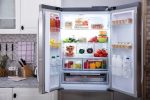Norcold fridges use a process called evaporative cooling to keep food and drinks cool. They convert an ammonia-based refrigerant into a gas that circulates through metal coils to absorb and remove heat from the fridge’s interior.
They are smaller than standard RV refrigerators and operate on 12V DC power with an energy-saving standby mode. They also have a sleeker design that fits narrow areas in RV builds.
Features
Norcold RV refrigerators come in a variety of styles and sizes. Their most basic line-up is a series of fridges that operate off either LP gas or electricity. The fridges automatically switch between power sources depending on what is available to them. They look more like a cooler than a traditional fridge and can be easily moved from place to place.
They are also known for being quiet and energy-efficient, which bolsters their reputation in the industry. They have a lot of the same features as Dometic and Vitrifrigo refrigerators but are made in America. Some of their latest refrigerators are the Polar series, which feature upgraded appearance with taller door panels for a more built-in look. They also have LCD display and recessed handles for a sleeker look. They are perfect for car campers or van camping and have cold weather capability down to 0° F.
Energy Efficiency
A Norcold refrigerator works a bit differently than most traditional household fridges. Instead of utilizing compressors to cool the food, they use heat to keep the food cold. This allows the fridge to operate while traveling or camping in an RV.
The company makes a variety of refrigerators that work in different ways to provide cooling for RVs. Some are absorption refrigerators that work on propane and electric power, while others are fully 12V DC compressor fridges that run solely on the engine & alternator of an RV’s truck or car.
Norcold’s N2000 Series of smaller AC refrigerators is a great example of an energy efficient fridge. These fridges are available in 3.3, 5.3, and 6.2 cu ft capacities. They feature Danfoss BD micro-compressors, as well as energy saving stand by and night modes. They also have reversible door bins and travel latches for safe transportation. They are ideal for van campers, car campers, and truck campers.
Temperature Control
Setting the proper temperature for your refrigerator and freezer and getting them to stay there can be challenging. The first step is to make sure the thermistor is located on the correct cooling fin. If it is located on any other spot it will provide the wrong reading which can lead to the fridge not cooling properly.
You can also check to make sure the thermistor is not bad by disconnecting it and measuring the resistance with a voltmeter. You can find the resistance value in a table in the Norcold refrigerator manual.
Another way to help your fridge and freezer stay cool is by making sure the vents are not blocked. You can also run a fan to help with this. This can help with cooling efficiency and keep the food fresher for longer. It will also prevent ice from building up in the freezer which can reduce its efficiency and shorten the life of your foods and drinks.
Warranty
This manufacturer is well known for their refrigerators made specifically for RV, boat and tractor trailer truck applications. Their unique gas absorption refrigerators vaporize and absorb ammonia via a gas burner, which then cools and condenses the resulting liquid water. These refrigerators have an edge over other refrigerators on the market because they do not rely on electric compressors, which are vulnerable to fire hazards and require regular maintenance.
This particular refrigerator is susceptible to a safety issue that causes the boiler tubes to corrode, creating a fire hazard. To help alleviate this problem, Norcold has agreed to pay $36 million and offer a warranty extension as part of a class action settlement with the plaintiffs.
If the refrigerator was dropped prior to your taking delivery, you should try to make a case to Heartland that they sold you a defective unit. If they won’t budge, you should try to get a residential refrigerator installed at a different service facility and sue them in small claims for their failure to catch the defect.
